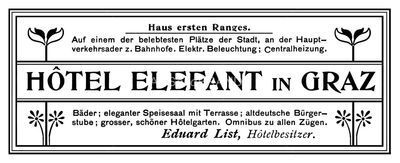Checking into the Hotel Elefant

A New York contemporary-music ensemble has sprung up with the intriguing name Hotel Elefant; it will make its debut on March 15, at the DiMenna Center for Classical Music, with a concert featuring works of David T. Little, Chinary Ung, Peter Bussigel, Leaha Maria Villarreal, and Mary Kouyoumdjian. I took notice when the name showed up in a press release, because it reminded me of a singular scene that I describe in the opening pages of The Rest Is Noise: a meeting of Strauss, Mahler, Puccini, and Schoenberg at the Hotel Elefant in Graz, following the Austrian premiere of Strauss's Salome at the Graz Opera, on May 16, 1906. The composers talked well into the night, although, alas, only a few scraps of their conversation were recorded. The following day, Strauss wrote to his wife mainly about himself: "It is raining, and I am sitting on the garden terrace of my hotel, in order to report to you that Salome went well, gigantic success, people applauding for ten minutes until the fire curtain came down, etc., etc."
 As it happens, when I was working on The Rest Is Noise, I spent an inordinate amount of time trying to track down information about the Hotel Elefant — the kind of obsessive pursuit of the tangential yet somehow essential detail that often overtakes authors of books. The debut of the Hotel Elefant ensemble is perhaps the only occasion I will ever have to disgorge this small store of trivia. There are various old hotels and inns called Elefant in Germany and Austria; the name was apparently inspired by an Indian elephant that Emperor Maximilian had brought to Vienna in 1552, its appearance causing great excitement along the way. Graz's Elefant had existed for centuries, and took on the status of a grand hotel when Eduard List opened a large new structure in 1889. (List's grandson Hans was a world authority on internal-combustion engines, as I learned from his memoirs.) After the Anschluss, the hotel was taken over by the Wehrmacht. An Elefant waiter named Adolf Stengl, horrified by Kristallnacht, attempted to warn foreign observers of the scale of the pogrom against Jews; for this action he was arrested, and was not heard from again. The hotel closed in 1945. It has made one notable appearance in fiction: in Thomas Pynchon's novel Against the Day, two characters meet in the hotel's garden, against the backdrop of the Bosnian Crisis of 1908-09.
As it happens, when I was working on The Rest Is Noise, I spent an inordinate amount of time trying to track down information about the Hotel Elefant — the kind of obsessive pursuit of the tangential yet somehow essential detail that often overtakes authors of books. The debut of the Hotel Elefant ensemble is perhaps the only occasion I will ever have to disgorge this small store of trivia. There are various old hotels and inns called Elefant in Germany and Austria; the name was apparently inspired by an Indian elephant that Emperor Maximilian had brought to Vienna in 1552, its appearance causing great excitement along the way. Graz's Elefant had existed for centuries, and took on the status of a grand hotel when Eduard List opened a large new structure in 1889. (List's grandson Hans was a world authority on internal-combustion engines, as I learned from his memoirs.) After the Anschluss, the hotel was taken over by the Wehrmacht. An Elefant waiter named Adolf Stengl, horrified by Kristallnacht, attempted to warn foreign observers of the scale of the pogrom against Jews; for this action he was arrested, and was not heard from again. The hotel closed in 1945. It has made one notable appearance in fiction: in Thomas Pynchon's novel Against the Day, two characters meet in the hotel's garden, against the backdrop of the Bosnian Crisis of 1908-09.
In 2001, as I was beginning to write my book, I stopped for a night in Graz. Turandot was playing at the opera house, in a bizarre production set in a futuristic pop-culture world of ultraviolent football games and striptease cheerleaders. The next morning, I went looking for the Elefant, clinging to the idea that I might be able to find an old hotel ledger in which all those famous names could still be read. But the Elefant was now the site of the local offices of the Austrian Trade Union Federation, and the ledger had disappeared. "Ja, there was a hotel here," an elderly desk clerk told me. "Eighteenth century. Nineteenth century. Long time ago." Standing in the parking lot where the garden used to be, I struggled to picture that rainy morning in 1906, when Richard Strauss said good-bye to Gustav Mahler, and sat contentedly on the terrace for a while.
Alex Ross's Blog
- Alex Ross's profile
- 425 followers



